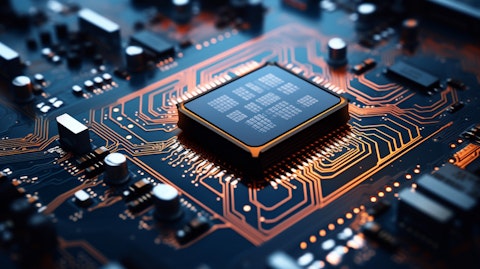We recently compiled a list of the 7 Best Data Storage Stocks To Buy Now. In this article we are going to take a look at where Micron Technology (NASDAQ:MU) stands against other data storage stocks.
The Future of Data Storage
Data storage refers to the systematic process of archiving digital information, ensuring its availability and security for future use. This process involves various storage methods, including direct attached storage, storage area networks, network attached storage, and software-defined storage, to maintain data in multiple formats such as text, images, and videos. Storage technologies range from traditional physical devices, like hard drives, to cloud-based solutions that offer scalability and accessibility from anywhere with an internet connection.
According to a report by Fortune Business Insights, the global data storage market was valued at $218.33 billion in 2024 and is expected to grow to $774.00 billion by 2032, with a CAGR of 17.1% during the forecast period. North America is the largest data storage market and contributed $78.98 billion to the market in 2023. A key factor contributing to market growth in the region is the increasing number of data centers. The COVID-19 pandemic has intensified the demand for storage and processing power as businesses strive to remain agile and responsive. At the same time, data centers are increasingly relying on cloud providers for their storage and processing needs, further boosting market growth in the region.
Generative AI has also played a key role in the growth of the data storage market, bringing transformative changes to data creation, processing, and storage needs. Advanced machine learning models, like GPT-3, can produce vast amounts of diverse and complex data. This increase in data generation has necessitated a reevaluation of storage architectures to accommodate the heightened volume, variety, and speed of the content being generated. Industries including entertainment, e-commerce, finance, healthcare, and manufacturing are all contributing to this surge in data production.
In a CNBC interview on May 30, Charlie Giancarlo, CEO of Pure Storage, talked about the current trends and challenges in the data storage industry and particularly focused on how artificial intelligence (AI) is influencing storage demand. Giancarlo highlighted three key areas where AI impacts storage: the need for storage to train AI models, using AI models on existing data, and upgrading existing data environments to be AI-ready. He emphasized that while AI investments may pressure other parts of tech budgets, data storage will remain a critical area that will likely continue to see investment.
According to IDC, the global storage needs were estimated at 33 billion terabytes in 2018 and this number is projected to reach 175 billion terabytes by 2025. The growing demand for data storage has led to the development of innovative, secure, and cost-effective solutions. Cloud storage has become a central element in modern data management. The adoption of big data and IoT is expected to further drive cloud storage growth. SSD technology, enhanced by data reduction techniques such as compression and deduplication helps maximize storage efficiency, making it ideal for large-scale data management. Manufacturers are introducing 3D NAND technology in storage devices. NAND is a type of non-volatile storage technology that does not require power. 3D NAND technology stacks cells vertically which allows greater capacity and reliability. While the technology offers significant benefits, such as increased storage density and reduced interference, it also comes with higher manufacturing costs.
Other emerging technologies like DNA data storage and object storage are also increasing capacity and reliability. DNA storage technology uses synthesized strands of DNA to encode and decode binary data and store up to 215,000 terabytes of data. Although still in development, DNA storage could become a viable option for critical data preservation in the future. Object storage offers a scalable and cost-effective solution for managing unstructured data by storing data as individual objects. This technology allows for quick retrieval and seamless data sharing across multiple platforms. As big data and IoT continue to grow, object storage will become increasingly essential for businesses needing to manage large volumes of data efficiently. Manufacturing companies are also implementing data security using encryption, blockchain, and AI, which safeguard data and automate threat detection.
As the digital landscape expands, innovative solutions like cloud storage, SSD optimizations, enhanced data security, AI-driven management, DNA storage, and 3D NAND will play crucial roles in meeting the growing demand for data storage solutions. With that in context, let’s take a look at the 7 best data storage stocks to buy now.
Our Methodology
We used cloud computing and data storage ETFs plus online rankings to compile an initial list of the best data storage stocks to buy now. We narrowed our list to the 7 stocks that analysts see the most upside to. The list is sorted in ascending order of analysts’ average upside potential, as of August 12. Note: We only included companies whose primary business is in the data storage industry.
At Insider Monkey we are obsessed with the stocks that hedge funds pile into. The reason is simple: our research has shown that we can outperform the market by imitating the top stock picks of the best hedge funds. Our quarterly newsletter’s strategy selects 14 small-cap and large-cap stocks every quarter and has returned 275% since May 2014, beating its benchmark by 150 percentage points (see more details here).

A close-up view of a computer motherboard with integrated semiconductor chips.
Micron Technology (NASDAQ:MU)
Upside Potential: 86.66%
Average Analyst Price Estimate: $173.74
Micron Technology (NASDAQ:MU) designs, develops, manufactures, and sells a wide range of memory and storage chips, including DRAM, NAND flash, and solid-state drives (SSDs) to major technology companies such as Microsoft, Apple, Dell, IBM, Nvidia, HP, Lenovo, and Samsung along with automotive manufacturers, telecom providers, government agencies, and research institutions globally.
Micron Technology (NASDAQ:MU) produces the world’s best high-bandwidth memory (HBM) storage devices for data centers that enhance GPU performance by fast storing and data processing. The new HBM3E architecture chips developed by Micron Technology (NASDAQ:MU) deliver better performance, have a smaller physical size, and use 30% less energy than competing products compared to memory generations, making it more cost-effective for data center operators.
In its second quarter investor letter, the ClearBridge Value Equity Strategy stated the following regarding Micron Technology, Inc. (NASDAQ:MU):
“Stock selection in the IT sector proved to be the largest contributor to performance, particularly driven by the strong performance of Micron Technology, Inc. (NASDAQ:MU) The company, which designs, develops, manufactures and sells memory and storage products, continued its strong performance alongside other AI beneficiaries as the anticipated demand for new and additional storage essential for housing and training large language AI models continues to grow.”
For the three months ended on May 30, Micron Technology (NASDAQ:MU) generated a revenue of $6.81 billion, up 82% compared to the same quarter in the previous year and surpassing expectations by $140 million. The company reported earnings of $0.62 per share, beating estimates by $0.09. Looking ahead, Micron Technology’s (NASDAQ:MU) next quarter earnings are forecasted to reach $1.08 per share, with revenues projected at $7.6 billion, reflecting continued strong demand.
As Micron Technology (NASDAQ:MU) continues to innovate and expand its product portfolio, particularly in high-growth areas like AI, the company is well-positioned to achieve its ambitious revenue of $25 billion in the financial year 2024, representing a 61% year-over-year increase. The stock is trading at $93.08 as of August 12. Industry analysts have a consensus on the stock’s Buy rating, setting an average share price target at $173.74, which represents an 86.66% upside potential from its current level.
Overall MU ranks 1st on our list of the best data storage stocks to buy. While we acknowledge the potential of MU as an investment, our conviction lies in the belief that AI stocks hold greater promise for delivering higher returns, and doing so within a shorter time frame. If you are looking for AI stock that is more promising than MU but trades at less than 5 times its earnings, checkout our report about the cheapest AI stock.
READ NEXT: $30 Trillion Opportunity: 15 Best Humanoid Robot Stocks to Buy According to Morgan Stanley and Jim Cramer Says NVIDIA ‘Has Become A Wasteland’.
Disclosure: None. This article is originally published at Insider Monkey.





